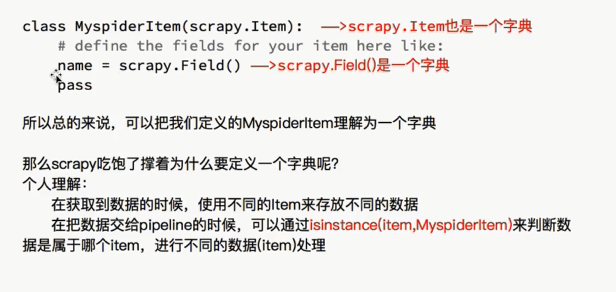一.Scrapy的日志等级
1.配置
- 在使用scrapy crawl spiderFileName运行程序时,在终端里打印输出的就是scrapy的日志信息。 - 日志信息的种类: ERROR : 一般错误 WARNING : 警告 INFO : 一般的信息 DEBUG : 调试信息
- 设置日志信息指定输出:
在settings.py配置文件中,加入
LOG_LEVEL = ‘指定日志信息种类’即可。
LOG_FILE = 'log.txt'则表示将日志信息写入到指定文件中进行存储,设置后终端不显示日志内容
注:日志在setting里面默认是没有的,需要自己添加
2.使用
#在需要些日志的py文件中导包 import logging
#这样实例化后可以在输出日志的时候知道错误的位置再那个文件产生的 LOGGER = logging.getLogger(__name__) def start_requests(self): if self.shared_data is not None: user = self.shared_data['entry_data']['ProfilePage'][0]['graphql']['user'] self.user_id = user['id'] self.count = user['edge_owner_to_timeline_media']['count'] LOGGER.info(' {} User id:{} Total {} photos. {} '.format('-' * 20, self.user_id, self.count, '-' * 20)) for i, url in enumerate(self.start_urls): yield self.request("", self.parse_item) else: LOGGER.error('-----[ERROR] shared_data is None.')
#如果不实例化也是可以的,直接
logging.info('dasdasdasd')
loggging.debug('sfdghj')
#这样不会日志不会显示产生错误的文件的位置
3.扩展,在普通程序中使用logging
import logging LOG_FORMAT = "%(asctime)s %(name)s %(levelname)s %(pathname)s %(message)s "#配置输出日志格式 DATE_FORMAT = '%Y-%m-%d %H:%M:%S %a ' #配置输出时间的格式,注意月份和天数不要搞乱了 logging.basicConfig(level=logging.DEBUG, format=LOG_FORMAT, datefmt = DATE_FORMAT , filename=r"d: est est.log" #有了filename参数就不会直接输出显示到控制台,而是直接写入文件 #实例化一个logger )
logger=logging.getLogger(__name__)
logger.debug("msg1") logger.info("msg2") logger.warning("msg3") logger.error("msg4") logger.critical("msg5")
二.如何提高scrapy的爬取效率
增加并发: 默认scrapy开启的并发线程为32个,可以适当进行增加。在settings配置文件中修改CONCURRENT_REQUESTS = 100值为100,并发设置成了为100。 降低日志级别: 在运行scrapy时,会有大量日志信息的输出,为了减少CPU的使用率。可以设置log输出信息为INFO或者ERROR即可。在配置文件中编写:LOG_LEVEL = ‘INFO’ 禁止cookie: 如果不是真的需要cookie,则在scrapy爬取数据时可以进制cookie从而减少CPU的使用率,提升爬取效率。在配置文件中编写:COOKIES_ENABLED = False 禁止重试: 对失败的HTTP进行重新请求(重试)会减慢爬取速度,因此可以禁止重试。在配置文件中编写:RETRY_ENABLED = False 减少下载超时: 如果对一个非常慢的链接进行爬取,减少下载超时可以能让卡住的链接快速被放弃,从而提升效率。在配置文件中进行编写:DOWNLOAD_TIMEOUT = 10 超时时间为10s
爬虫文件.py
# -*- coding: utf-8 -*- import scrapy from xiaohua.items import XiaohuaItem class XiahuaSpider(scrapy.Spider): name = 'xiaohua' allowed_domains = ['www.521609.com'] start_urls = ['http://www.521609.com/daxuemeinv/'] pageNum = 1 url = 'http://www.521609.com/daxuemeinv/list8%d.html' def parse(self, response): li_list = response.xpath('//div[@class="index_img list_center"]/ul/li') for li in li_list: school = li.xpath('./a/img/@alt').extract_first() img_url = li.xpath('./a/img/@src').extract_first() item = XiaohuaItem() item['school'] = school item['img_url'] = 'http://www.521609.com' + img_url yield item if self.pageNum < 10: self.pageNum += 1 url = format(self.url % self.pageNum) #print(url) yield scrapy.Request(url=url,callback=self.parse)
items.py
# -*- coding: utf-8 -*- # Define here the models for your scraped items # # See documentation in: # https://doc.scrapy.org/en/latest/topics/items.html import scrapy class XiaohuaItem(scrapy.Item): # define the fields for your item here like: # name = scrapy.Field() school=scrapy.Field() img_url=scrapy.Field()
pipline.py
# -*- coding: utf-8 -*- # Define your item pipelines here # # Don't forget to add your pipeline to the ITEM_PIPELINES setting # See: https://doc.scrapy.org/en/latest/topics/item-pipeline.html import json import os import urllib.request class XiaohuaPipeline(object): def __init__(self): self.fp = None def open_spider(self,spider): print('开始爬虫') self.fp = open('./xiaohua.txt','w') def download_img(self,item): url = item['img_url'] fileName = item['school']+'.jpg' if not os.path.exists('./xiaohualib'): os.mkdir('./xiaohualib') filepath = os.path.join('./xiaohualib',fileName) urllib.request.urlretrieve(url,filepath) print(fileName+"下载成功") def process_item(self, item, spider): obj = dict(item) json_str = json.dumps(obj,ensure_ascii=False) self.fp.write(json_str+' ') #下载图片 self.download_img(item) return item def close_spider(self,spider): print('结束爬虫') self.fp.close()
settings.py
USER_AGENT = 'Mozilla/5.0 (Macintosh; Intel Mac OS X 10_12_0) AppleWebKit/537.36 (KHTML, like Gecko) Chrome/68.0.3440.106 Safari/537.36' # Obey robots.txt rules ROBOTSTXT_OBEY = False # Configure maximum concurrent requests performed by Scrapy (default: 16) CONCURRENT_REQUESTS = 100 COOKIES_ENABLED = False LOG_LEVEL = 'ERROR' RETRY_ENABLED = False DOWNLOAD_TIMEOUT = 3 # Configure a delay for requests for the same website (default: 0) # See https://doc.scrapy.org/en/latest/topics/settings.html#download-delay # See also autothrottle settings and docs # The download delay setting will honor only one of: #CONCURRENT_REQUESTS_PER_DOMAIN = 16 #CONCURRENT_REQUESTS_PER_IP = 16 DOWNLOAD_DELAY = 3
三.反爬处理
1.设置download_delay:设置下载的等待时间,大规模集中的访问对服务器的影响最大。download_delay可以设置在settings.py中,也可以在spider中设置 2.禁止cookies(参考 COOKIES_ENABLED),有些站点会使用cookies来发现爬虫的轨迹。在settings.py中设置COOKIES_ENABLES=False 3.使用user agent池,轮流选择之一来作为user agent。需要编写自己的UserAgentMiddle中间件 4.使用IP池。Crawlera 第三方框架可以解决爬网站的ip限制问题,下载 scrapy-crawlera Crawlera 中间件可以轻松集成该功能 5.分布式爬取。使用 Scrapy-Redis 可以实现分布式爬取蚊
四.多pipeline的处理
为什么需要有多pipeline的情况 :
1.可能有多个spider,不同的pipeline处理不同的内容
2.一个spider可能要做不同的操作,比如,存入不同的数据库当中
方式一:在pipeleine中判断爬虫的名字
class InsCrawlPipeline(object): def process_item(self, item, spider): if spider.name=='jingdong': pass return item class InsCrawlPipeline1(object): def process_item(self, item, spider): if spider.name=='taobao': pass return item class InsCrawlPipeline2(object): def process_item(self, item, spider): if spider.name=='baidu': pass return item
或者:一个pipine类中判断爬虫的名字:
class InsCrawlPipeline(object): def process_item(self, item, spider): if spider.name=='jingdong': pass elif spider.name=='taobao': pass elif spider.name=='baidu': pass return item
方式二:在爬虫文件的item中加一个key
spider.py
def parse(): item={} item['come_from']='badiu'
pipline.py
class InsCrawlPipeline(object): def process_item(self, item, spider): if item['come_from']=='taobao': pass elif item['come_from']=='jingdong': pass elif item['come_from']=='badiu': pass return item
五.多item的处理
在item.py
class YangguangItem(scrapy.Item): # define the fields for your item here like: # name = scrapy.Field() title = scrapy.Field() href = scrapy.Field() publish_date = scrapy.Field() content = scrapy.Field() content_img = scrapy.Field() class TaobaoItem(scrapy.Item): # define the fields for your item here like: # name = scrapy.Field() pass class JingDongItem(scrapy.Item): # define the fields for your item here like: # name = scrapy.Field() pass
pipeline.py
class YangguangPipeline(object): def process_item(self, item, spider): if isinstance(item,TaobaoItem): collection.insert(dict(item))
elif isinstance(item,JingDongItem)
return item
